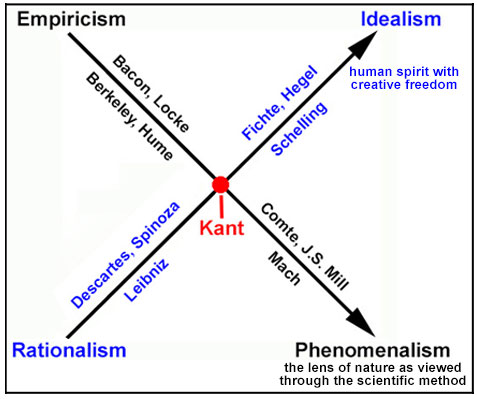German
Idealism
Background
Immanuel
Kant bridged the two dominant philosophical schools in the 18th century:
1) Empiricism - knowledge attained
through the senses alone a posteriori (after experience),
2) Rationalism - knowledge could be attained by reason alone a priori (before
to experience).

The solution Kant proposed was that certain knowledge
transcends sensory evidence a priori known as
‘transcendental
idealism’. The philosophical meaning of idealism is that the properties we discover in
objects depend on the way we perceive them, not on something they possess ‘in-themselves’.
The period after Kant is known as post-Kantian idealism or
post-Kantianism of which subsequent strains became German idealism where the idealism is a monistic idealism. The two broad categories of the German idealist
thinkers:
1) Transcendental: Kant, Fichte
2) Absolute: Schelling,
Hegel
The Creative Self
Continental Rationalism moved on to German idealism which was a reaction against Kant's Critique of Pure
Reason (CPR) and to mechanistic science. An organic model with a focus on a priori
knowledge that emphasized the creative Self -
the inner intellectual resources and rationality of the Self. It was closely linked with both Romanticism and
the revolutionary politics of the Enlightenment. And it was a continuation of Kant’s Copernican Revolution – the subject, rather than the object, is central to
knowledge.
Structure of Consciousness

The late professor of philosophy Dr. Arthur Holmes (Wheaton
college) sheds some clarifying thoughts on German Idealism:
“We've observed during the modern period from Descartes to culminating in Kant the ongoing question about the nature of
the self. What am I?
Descartes says, "A thinking thing!" Locke
isn't so sure. Hume
finds only a bundle of perceptions with nothing to unify. Kant finds that there is this synthetic unity of our
perceptions (functional unity). Whereby there is some sort of unification of the field of consciousness. It is
the structure of consciousness that is the unifier.
That is the point of departure for the German Idealist. They are not looking for some 'mind substance' or 'soul
substance' in the Cartesian sense. They are not looking for immortal souls in the Platonic sense that have some
eternal preexistence. What the German Idealist are trying to understand is the Self as structured
consciousness. What is the unifying action of the Self? You get different answers. Functional unities.
1) Fichte: moral consciousness. Takes off from Kant's Critique of Practice Reason.
2) Schelling: what Kant calls the teleological in the Critique of Judgment - the Aesthetic consciousness.
Schelling is the major philosopher of German Romanticism.
3) Hegel: simply says no; it's this conceptual capacity that we have. The ongoing process of trying to graph
the concept of being. You have to distinguish the finite self (unity of the self) and the Absolute Self
(monistic). Absolute in the sense of the one all inclusive 'ground of being'.
| 
